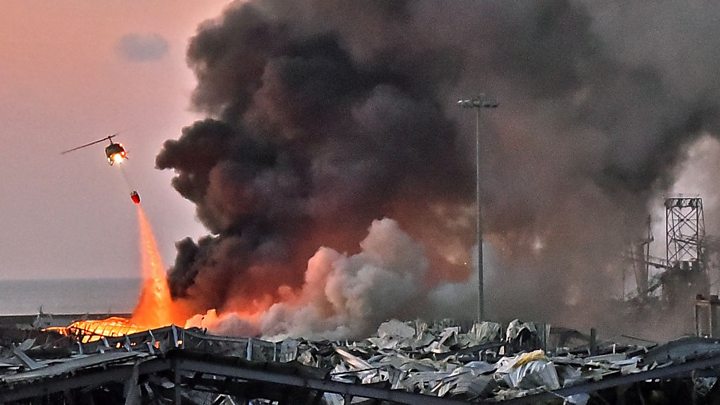
Media playback is unsupported on your device
The UK is ready to send medical experts and humanitarian aid to Lebanon following the deadly explosion in Beirut, Foreign Secretary Dominic Raab has said.
Mr Raab said the UK would "stand by the Lebanese people in their time of need" and promised a £5m aid package.
He also said a Royal Navy ship was nearby which could be sent to help assess the damage to the port.
The blast on Tuesday killed at least 100 people and injured more than 4,000.
Rescue workers are continuing to search for survivors from the explosion. Lebanon's president has said it was caused by ammonium nitrate stored unsafely in a warehouse.
Health authorities and the Red Cross are struggling to deal with the aftermath, and the Lebanese government has announced a two-week state of emergency in Beirut.
Mr Raab said he was not sure on the precise number of UK nationals who may have been hurt, but the embassy was "monitoring that very carefully".
"I've just spoken to the Lebanese prime minister Hassan Diab," Mr Raab told reporters on Tuesday afternoon. "We are going to stand by the Lebanese people in their time of need.
He said measures that were "ready to go" included humanitarian aid of £5m, medical experts, search and rescue experts, and a nearby Royal Navy survey ship to help assess the damage to the port.
Image copyright Reuters Image caption Mr Raab said the UK would provide help that is "exactly what is tailored towards the Lebanese needs"Meanwhile, the Queen said she and Prince Philip were "deeply saddened" by the news.
"Our thoughts and prayers are with the families and friends of those who have been injured or lost their lives, and all those whose homes and livelihoods have been affected," she said in a message of condolence.
UK Conservative MP Tobias Ellwood, who chairs the Commons defence select committee, said the West needed to be "far more greatly involved in helping" Lebanon, which he described as "a country that's been on its knees for decades".
Even before Tuesday's explosion, tensions were high in Lebanon, with street demonstrations against the government's handling of the worst economic crisis since the 1975-1990 civil war.
Many blame the ruling elite, who have dominated politics for years. People have to deal with daily power cuts, a lack of safe drinking water and limited public healthcare.
Image copyright Reuters Image caption The whole city was shaken by the explosionMr Ellwood said the international community has "taken a step back strategically from the Middle East and Lebanon is paying the price for that".
"There's massive corruption in the government itself - it's poorly governed. Economic crisis - there's a quarter of the people out of work there. And of course they've had their own lockdown issues with Covid-19. On top of that over a million refugees have spilled across from Syria. And I have to say there's been dwindling international support... And now this," he said.
Mr Raab said the "wider challenges facing Lebanon and the region haven't gone away" and that the UK would be "looking at ways in which we can help with their medium term challenges on governance on financial support, given the situation there".
He also said he and Lebanon's PM had discussed the need for "a full, thorough and rigorous investigation to get to the truth" of how the blast happened, adding: "I think the people of Lebanon deserve no less."
Earlier, Labour leader Sir Keir Starmer called for the UK to offer Lebanon its "full support" to deal with the crisis.
The SNP's foreign affairs spokesman also called for the UK to give "immediate humanitarian assistance" to Lebanon, as well as enter talks to possibly suspend its state debt.

 5 years ago
522
5 years ago
522 

